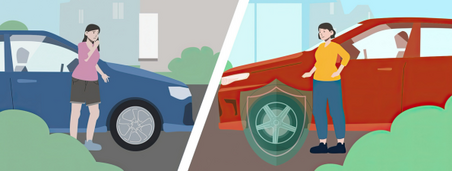Will 2024 See Generative AI in Our Cars?

As we cruise into 2024, technology and innovation are racing ahead in the automotive arena, at a pace that is as exciting as it is potentially terrifying. Terrifying why? Because of Artificial Intelligence (AI).
Elon Musk has said of Generative AI that it could become an "immortal dictator from which we would never escape," if it surpasses human intelligence without proper oversight. While Bill Gates confirms that: “Generative AI has the potential to change the world in ways that we can’t even imagine.”
Another, Mustafa Suleyman, co-founder of DeepMind, an AI company acquired by Google, has warned of the importance of transparency and accountability in AI development and called for more robust ethical frameworks to contain it.
Yet AI is already beginning to permeate and become integral to our work and leisure lives as a useful and invaluable tool. And you will see Generative AI in your cars by the second quarter of this year.
Too Early for Driverless Cars
Does that mean that cars that drive themselves will become commonplace in the coming 12 months?
Not quite. Autonomous cars are still further away, though perhaps not as far into the future as was previously thought, as AI is proving to be an even faster learner than originally anticipated. However, the development of fully aware and reliable sensors, and failsafe drive systems, as well as the societal, ethical and legislative roadblocks to autonomy, will still take a little longer to be resolved.
Knight Rider – the Talking Car
In pop culture, the ultimate AI-powered car was of course KITT (Knight Industries Two Thousand), the black 1982 Pontiac Firebird Trans Am from the hit 1980s TV show, Knight Rider. The talking, self-driving car, was as much a star as David Hasselhoff playing the lead character Michael Knight in the show.
KITT demonstrated a high level of reasoning and understanding, often offering guidance, advice and insightful observations. It was also shown to demonstrate humour and sardonic wit, often engaging in banter with Michael.
The question for 2024 is, how close are we to having such companionship in our cars? Very close actually and several major players are hard at work to make it happen, including the aforementioned Google.
Continental is creating an In-Car Companion AI
Continental, the German automotive supplier, and the fourth-largest tyre manufacturer, has tied up with Google Cloud to equip cars with generative AI. With this, drivers can interact with their cars in a natural dialogue. For example, if drivers need help finding the right tyre pressure when the car is fully loaded, or want to know more about places of interest along their route, the AI will answer the drivers’ questions. The driver can also ask follow-up questions without repeating the whole context, so it’ll feel like a natural conversation.
“Together with Google, we are bringing artificial intelligence to the vehicle cockpit and are creating an intuitive experience for drivers. Based on our Smart Cockpit High-Performance Computer, we expect our solution to be ready for production within months,” revealed Philipp von Hirschheydt, member of Continental’s Executive Board and head of the Automotive group sector.
Volkswagen, Mercedes and BMW Virtual Assistants
Volkswagen has just confirmed that it will integrate OpenAI's ChatGPT generative AI into its vehicles. Models equipped with IDA Voice assistant will deploy ChatGPT through Cerence Chat Pro, making Volkswagen the first major car company to offer Generative AI as standard in its cars from the second quarter of 2024. However, ChatGPT will not gain access to any vehicle data and conversations are deleted immediately to ensure there is no breach of data-protection legislation.
With the next evolution of the MBUX infotainment system and MB.OS software platform, Mercedes is set to introduce an AI-powered virtual assistant that promises a new dimension of in-car entertainment and interaction.
Interestingly when BMW revealed its I Vision Dee concept car last year, one of the promotional videos actually featured a surprise cameo by KITT and David Hasselhoff himself. The link they were trying to draw was obvious.
BMW's Digital Emotional Experience, known as DEE, featured on the I Vision Dee, is said to embody the car's personality, engaging with drivers in a more intuitive and emotional manner.
Japanese Shinto Beliefs Embrace AI
Don’t discount the Japanese and Koreans either. Hyundai has been active in incorporating AI and advanced technologies into its cars. Likewise, Toyota and Honda are also heavily invested in AI research and development, including aspects of generative AI to enhance safety, efficiency, and user interaction.
Japanese culture generally exhibits a more accepting and positive attitude towards robots and AI, largely influenced by factors like popular media, historical Shinto beliefs of animism, and a national push for technological innovation. So expect to see AI enthusiastically embraced.
Why do we need AI in our Cars?
These initiatives symbolise a shift from cars as utility machines to sentient companions capable of understanding and responding to the nuances of casual human conversation. In other words, yes, your car will become a friend that you can chat with during your drive.
But is the implementation of AI-powered companions in cars just a fanciful luxury?
As modern cars are increasingly accused of becoming less visceral and engaging, manufacturers are seeking to find ways to make you feel more engaged and connected to your car. It’s partly about reinventing our relationship with the automobile.
The cars of tomorrow are set to be more than mere transport; they will be smart, empathetic companions, capable of conversing, learning, and perhaps even understanding our emotions. This isn't just about making cars smarter; it's about forging a new, interactive relationship between humans and their vehicles, ensuring every journey is personalised, safe, and enjoyable.
AI in cars is more than a fleeting trend. It's a pivotal movement set to redefine our vehicular experiences.




